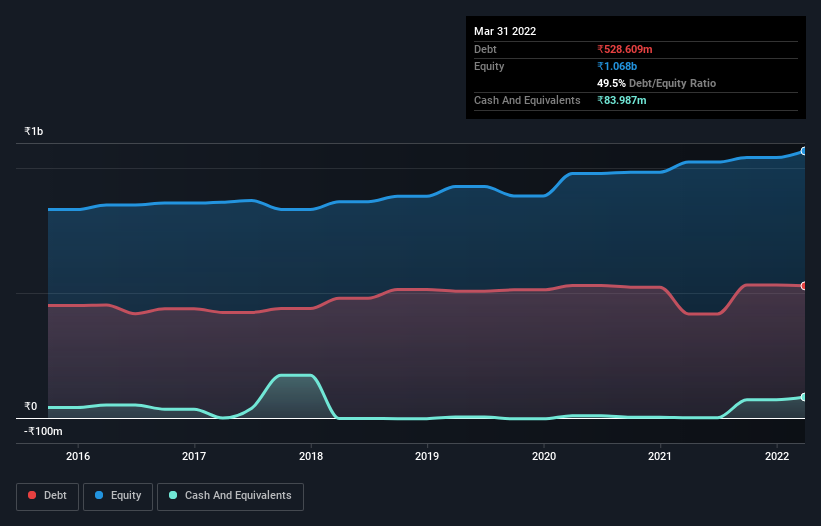- India
- /
- Metals and Mining
- /
- NSEI:VASWANI
Vaswani Industries (NSE:VASWANI) Seems To Use Debt Quite Sensibly
Warren Buffett famously said, 'Volatility is far from synonymous with risk.' When we think about how risky a company is, we always like to look at its use of debt, since debt overload can lead to ruin. We note that Vaswani Industries Limited (NSE:VASWANI) does have debt on its balance sheet. But should shareholders be worried about its use of debt?
When Is Debt A Problem?
Debt and other liabilities become risky for a business when it cannot easily fulfill those obligations, either with free cash flow or by raising capital at an attractive price. Ultimately, if the company can't fulfill its legal obligations to repay debt, shareholders could walk away with nothing. While that is not too common, we often do see indebted companies permanently diluting shareholders because lenders force them to raise capital at a distressed price. Of course, plenty of companies use debt to fund growth, without any negative consequences. When we examine debt levels, we first consider both cash and debt levels, together.
Check out our latest analysis for Vaswani Industries
What Is Vaswani Industries's Debt?
You can click the graphic below for the historical numbers, but it shows that as of March 2022 Vaswani Industries had ₹528.6m of debt, an increase on ₹416.4m, over one year. However, it also had ₹84.0m in cash, and so its net debt is ₹444.6m.

How Strong Is Vaswani Industries' Balance Sheet?
Zooming in on the latest balance sheet data, we can see that Vaswani Industries had liabilities of ₹870.9m due within 12 months and liabilities of ₹230.9m due beyond that. Offsetting these obligations, it had cash of ₹84.0m as well as receivables valued at ₹776.6m due within 12 months. So it has liabilities totalling ₹241.1m more than its cash and near-term receivables, combined.
While this might seem like a lot, it is not so bad since Vaswani Industries has a market capitalization of ₹640.5m, and so it could probably strengthen its balance sheet by raising capital if it needed to. However, it is still worthwhile taking a close look at its ability to pay off debt.
We use two main ratios to inform us about debt levels relative to earnings. The first is net debt divided by earnings before interest, tax, depreciation, and amortization (EBITDA), while the second is how many times its earnings before interest and tax (EBIT) covers its interest expense (or its interest cover, for short). This way, we consider both the absolute quantum of the debt, as well as the interest rates paid on it.
While Vaswani Industries has a quite reasonable net debt to EBITDA multiple of 2.3, its interest cover seems weak, at 1.7. This does suggest the company is paying fairly high interest rates. In any case, it's safe to say the company has meaningful debt. We saw Vaswani Industries grow its EBIT by 7.9% in the last twelve months. That's far from incredible but it is a good thing, when it comes to paying off debt. There's no doubt that we learn most about debt from the balance sheet. But it is Vaswani Industries's earnings that will influence how the balance sheet holds up in the future. So if you're keen to discover more about its earnings, it might be worth checking out this graph of its long term earnings trend.
Finally, while the tax-man may adore accounting profits, lenders only accept cold hard cash. So we clearly need to look at whether that EBIT is leading to corresponding free cash flow. During the last three years, Vaswani Industries produced sturdy free cash flow equating to 67% of its EBIT, about what we'd expect. This cold hard cash means it can reduce its debt when it wants to.
Our View
Vaswani Industries's interest cover was a real negative on this analysis, although the other factors we considered were considerably better. In particular, we are dazzled with its conversion of EBIT to free cash flow. Looking at all this data makes us feel a little cautious about Vaswani Industries's debt levels. While we appreciate debt can enhance returns on equity, we'd suggest that shareholders keep close watch on its debt levels, lest they increase. The balance sheet is clearly the area to focus on when you are analysing debt. However, not all investment risk resides within the balance sheet - far from it. Be aware that Vaswani Industries is showing 3 warning signs in our investment analysis , you should know about...
Of course, if you're the type of investor who prefers buying stocks without the burden of debt, then don't hesitate to discover our exclusive list of net cash growth stocks, today.
New: Manage All Your Stock Portfolios in One Place
We've created the ultimate portfolio companion for stock investors, and it's free.
• Connect an unlimited number of Portfolios and see your total in one currency
• Be alerted to new Warning Signs or Risks via email or mobile
• Track the Fair Value of your stocks
Have feedback on this article? Concerned about the content? Get in touch with us directly. Alternatively, email editorial-team (at) simplywallst.com.
This article by Simply Wall St is general in nature. We provide commentary based on historical data and analyst forecasts only using an unbiased methodology and our articles are not intended to be financial advice. It does not constitute a recommendation to buy or sell any stock, and does not take account of your objectives, or your financial situation. We aim to bring you long-term focused analysis driven by fundamental data. Note that our analysis may not factor in the latest price-sensitive company announcements or qualitative material. Simply Wall St has no position in any stocks mentioned.
About NSEI:VASWANI
Vaswani Industries
Engages in the manufacture and trading of iron and steel products in India.
Solid track record with mediocre balance sheet.
Market Insights
Community Narratives




